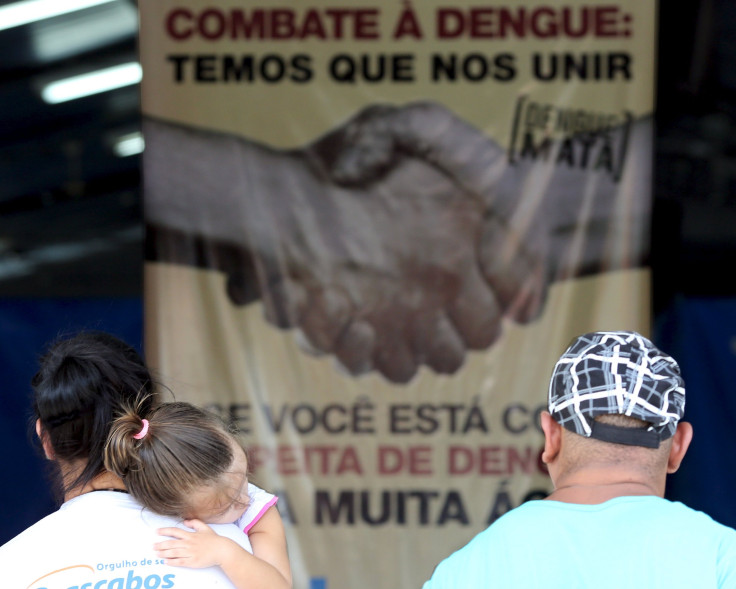Brazil Dengue Fever Outbreak Exposes Tough Challenge For Pres. Dilma Rousseff

SAO PAULO (Reuters) - An epidemic of dengue fever is fanning public anger over what Brazilians say is President Dilma Rousseff's biggest challenge - the sad state of the national healthcare system.
About 750,000 cases of the mosquito-borne virus have been confirmed this year in this country of 200 million people, leading to waits of four hours or longer at some hospitals.
The disease, which causes fever and joint pain, has killed 229 people so far this year - up 45 percent from the same period in 2014.
Health Minister Arthur Chioro has blamed the outbreak in part on a severe drought in Brazil's southeast, an area including Sao Paulo where dengue has been most prevalent. Many people stored water in buckets for fear their taps would run dry, creating a perfect breeding ground for mosquitoes. However, many point their finger back at the government.
Brazil promises universal healthcare in its constitution, but the system is underfunded and poorly managed, critics say. While Rousseff's government budgeted 10.1 million reais ($3.3 million) in 2014 to explore new ways to combat dengue, it only spent about 60 percent of that due to a lack of viable projects, among other reasons, the health ministry said.
This month, opposition party leaders of a Senate committee summoned Chioro to testify why the funds weren't spent.
In recent polls, Brazilians have identified healthcare as the country's biggest problem - even at a time when the economy is probably in recession and Rousseff faces a huge corruption scandal at state-run oil company Petrobras.
People with dengue symptoms waiting at a clinic in São Paulo this week argued the problems were connected.
"If this government stole less, I would have seen a doctor by now," said Raimunda da Costa, 52, prompting a chorus of agreement from a dozen others languishing in line.
In truth, the $1 billion or so that prosecutors believe was misappropriated in the Petrobras scandal over a decade is dwarfed by the $33 billion the health ministry spent last year. The federal government also shares responsibility for the public healthcare system with state and city governments.
Nevertheless, anger over poor public services has been a "central cause" of Rousseff's low approval rating of about 19 percent, as well as anti-government street protests that have flared in the last two years, said Marcus Melo, a political analyst.
Brazilians pay some of Latin America's highest taxes - roughly double what Chileans pay in percentage terms, and comparable to what Britons or Canadians shell out - which makes waiting for hours to see a doctor seem even more unbearable.
"People don't feel they're getting what they pay for," said Melo. "In the current context, where people's pocketbooks are hurting, it's no wonder there's so much dissatisfaction."
FLEEING TO PRIVATE SYSTEM
Brazilians who can afford private-sector plans have access to some of South America's best medical care, but roughly 70 percent of the population relies on the public system.
The government only spends about 4 percent of gross domestic product on healthcare - compared to more than 7 percent in other countries that guarantee universal access such as Britain and Sweden, according to Brazil's Federal Council of Medicine (CFM), a non-profit group.
Rousseff's government argues the ruling Workers' Party has throughout 12 years in power made progress from a very low base.
Indeed, CFM data shows government health spending has risen 80 percent on an inflation-adjusted basis since 2003. In response to e-mailed questions, the health ministry pointed to new, more efficient procurement procedures and said federal health spending will rise another 6 percent this year. Numerous health indicators have improved recently.
Brazil's infant mortality rate has fallen by half since 2000, while life expectancy at birth has risen from 66 years in 1990 to 75 years in 2013, according to the World Health Organization.
Nevertheless, in a nationwide poll by Datafolha taken last June, 87 percent of respondents said they were unsatisfied with the public system.
Even the private-sector system is not a panacea. Monica Salim, a clerical worker, said she took a second job as a tutor to afford a roughly $400-a-month private health plan for her father, a 74-year-old with prostate problems. Salim was waiting at a special "tent" set up for people with dengue symptoms, rubbing glassy eyes typical of the disease.
"There's a solution to these problems in Brazil," she said. "Never get sick."
(Editing by Todd Benson and Kieran Murray)
Published by Medicaldaily.com



























